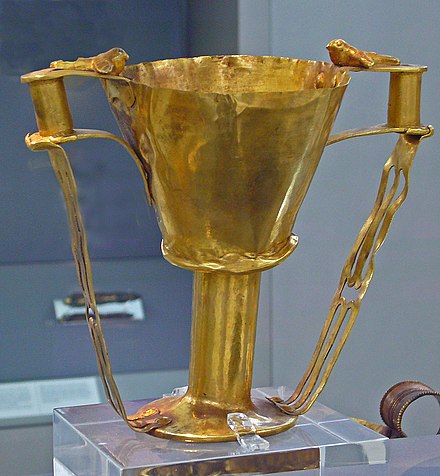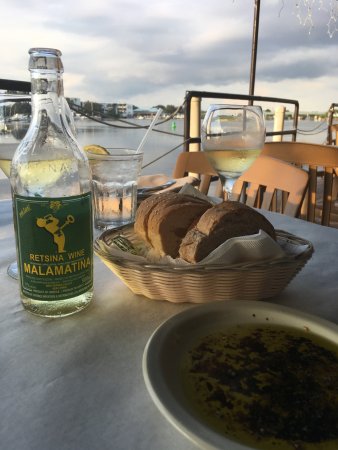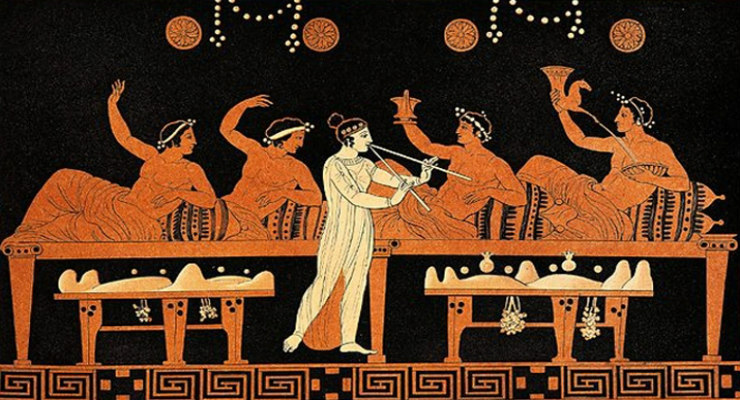By Van Bryan, Contributing Writer, Classical Wisdom
Wining and dining — and philosophizing — is the way the Ancients celebrated life. In fact, wine was a cultural staple for the ancient Greeks. Considering that their civilization is the foundation for much of western civilization, wine becomes an important part of our collective heritage.
Archaeological digs that have unearthed extravagant, presumably once wine-toting goblets dating as far back as the Mycenaean era of Greece. Such artifacts included gold and silver goblets that demonstrated that the people of the Mycenaean era were not only fierce warriors, but also people of sophistication who were aware of wine and respected it greatly.
One artifact of particular interest is the Cup of Nestor. This Golden goblet was discovered by Heinrich Schliemann in 1876 in the ancient civilization of Mycenae. It is believed to have belonged to the ancient king Nestor of Pylos, who was a prominent character in The Iliad.
Homer describes the goblet of Nestor as follows:
“There were four handles on it, around each one a pair of golden doves was feeding. Below were two supports. When that cup was full, another man could hardly lift it from the table, but, old as he was, Nestor picked it up with ease.” — The Iliad

The Cup of Nestor or dove cup is a gold goblet discovered in 1876 by Heinrich Schliemann in Shaft IV of Grave Circle A, Mycenae.
It is commonly held that large scale production, distribution, and consumption of wine began on the prominent island of Crete. Depictions of primitive wine presses can be seen on the walls of Minoan tombs dating as far back to 3000 BCE. Clay goblets and carafes have been uncovered across the island, including in the ancient palace of King Minos in the city of Knossos.
It is believed the craft of wine making began on this island and slowly made the transfer to the mainland of Greece. The ancient Greeks traded wine as a commercial product for centuries across their regions.
Indeed, Greek wine was traded throughout the entire known ancient world. Wines from islands such as Crete, Rhodes, and Lesvos were especially popular. Homer himself writes about the wonderful supply of wine found in cellars outside the city of Troy. The Aegean was so saturated with wine trading ships that Homer would refer to it as “the wine-dark sea”.

Were the wine-dark seas from wine?
In order to accommodate high demand, the ancients developed new wine storage techniques that enabled it to be transported long distances without spoiling. Before the time of air-tight glass bottles, wine left in a regular barrel would be exposed to oxygen and spoil quickly.
The ancient Greeks began the practice of sealing these wine barrels with pine resin to prevent it from spoiling. The resin helped make the barrels air-tight while simultaneously adding a distinct pine aroma to the drink.
This distinctive taste is still alive today in the form of “Restina”, a modern white wine that emulates the flavor of ancient times.

Restina… not everyone’s cup of wine…
An interesting anecdote claims the use of pine resin was for a very different reason. According to this theory, Roman soldiers would regularly plunder the cities of Greece and make off with their stores of wine. The Greek citizens became so angry that they began using pine resin to add a bitter aroma to their wine. The Roman invaders would try one sip of this distinctive wine, taste the bitterness and assume it was spoiled.
In this way the Greeks would keep their wines and the invaders would be none the wiser. This idea would seem to lead to the thought that the Greeks would take measures to protect their wines while the invaders would make off with their women and treasures. At least they had their priorities straight…??
Wine in ancient Greece was of enormous cultural significance. The ancients drank wine to praise the gods and expand their minds. They studied it intently to decipher it’s presumed health benefits and risks.
It was a nutritional staple, a religious experience: indeed, the production, distribution, and consumption of wine is so deeply ingrained with the culture of ancient Greece, that you simply can not have one without the other.










No comments yet. You should be kind and add one!
Our apologies, you must be logged in to post a comment.